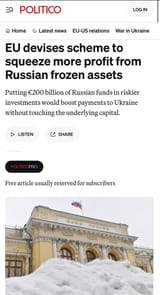Search Results
6/19/2025, 5:16:03 PM
Flip fren. As a /biz/nik, you will appreciate it
The European Union is exploring a plan to move nearly €200 billion ($229 billion) in frozen Russian sovereign assets into a special-purpose fund that would pursue riskier investments, a strategy designed to generate higher returns to finance aid for Ukraine.
The proposal, reported by Politico and confirmed by officials familiar with the discussions, would shift the assets from the Belgian-based securities depository Euroclear. Under current rules, Euroclear is obliged to invest the cash—generated as the frozen assets mature—in ultra-safe instruments via Belgium's central bank, which provides only modest returns. By transferring the capital to a new EU-managed vehicle, the bloc could pursue higher-yield investments, significantly boosting the profits available for Ukraine.
This financial maneuver aims to address several pressing challenges. With the EU’s €18 billion share of a G7 loan to Ukraine set to be depleted by year-end, there is an urgent need to secure a sustainable funding stream for 2026 and beyond. The move is also seen as a potential workaround to an anticipated veto from Hungary's Prime Minister Viktor Orbán on the biannual renewal of sanctions that keep the assets immobilized.
EU officials emphasize that the plan would only use the windfall profits generated from the assets, leaving the principal capital untouched. This distinction is crucial for member states like Germany and Italy, who have resisted outright confiscation due to concerns it would violate international law and undermine the euro's stability.
EU finance ministers are scheduled to begin informal discussions on the proposal this week in Luxembourg, as they seek a legally sound and politically viable path to continue funding for Ukraine amid the protracted war and political uncertainties.
The European Union is exploring a plan to move nearly €200 billion ($229 billion) in frozen Russian sovereign assets into a special-purpose fund that would pursue riskier investments, a strategy designed to generate higher returns to finance aid for Ukraine.
The proposal, reported by Politico and confirmed by officials familiar with the discussions, would shift the assets from the Belgian-based securities depository Euroclear. Under current rules, Euroclear is obliged to invest the cash—generated as the frozen assets mature—in ultra-safe instruments via Belgium's central bank, which provides only modest returns. By transferring the capital to a new EU-managed vehicle, the bloc could pursue higher-yield investments, significantly boosting the profits available for Ukraine.
This financial maneuver aims to address several pressing challenges. With the EU’s €18 billion share of a G7 loan to Ukraine set to be depleted by year-end, there is an urgent need to secure a sustainable funding stream for 2026 and beyond. The move is also seen as a potential workaround to an anticipated veto from Hungary's Prime Minister Viktor Orbán on the biannual renewal of sanctions that keep the assets immobilized.
EU officials emphasize that the plan would only use the windfall profits generated from the assets, leaving the principal capital untouched. This distinction is crucial for member states like Germany and Italy, who have resisted outright confiscation due to concerns it would violate international law and undermine the euro's stability.
EU finance ministers are scheduled to begin informal discussions on the proposal this week in Luxembourg, as they seek a legally sound and politically viable path to continue funding for Ukraine amid the protracted war and political uncertainties.
Page 1
